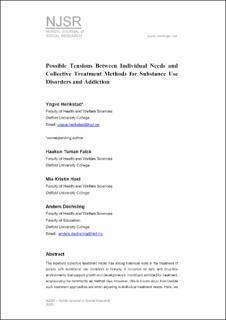| dc.contributor.author | Herikstad, Yngve | |
| dc.contributor.author | Falck, Haakon Tuman | |
| dc.contributor.author | Hoel, Mia Kristin | |
| dc.contributor.author | Dechsling, Anders | |
| dc.date.accessioned | 2021-02-17T23:58:34Z | |
| dc.date.available | 2021-02-17T23:58:34Z | |
| dc.date.created | 2020-11-06T22:26:10Z | |
| dc.date.issued | 2020-12-30 | |
| dc.identifier.citation | Nordic Journal of Social Research. 2020, 11 (1), 175-194. | en_US |
| dc.identifier.issn | 1892-2783 | |
| dc.identifier.uri | https://hdl.handle.net/11250/2728785 | |
| dc.description.abstract | The inpatient collective treatment model has strong historical roots in the treatment of people with substance use disorders in Norway. It focusses on safe and drug-free environments that support growth and development in individuals admitted for treatment, emphasising the community as method idea. However, little is known about how flexible such treatment approaches are when adjusting to individual treatment needs. Here, we explore how such individual treatment needs are safeguarded within the framework of collective inpatient institutional settings by interviewing treatment staff members who hold a bachelor’s degree in social or health sciences (N= 5). The focus of our analysis is on exploring the possible challenges that may occur as a result of competing conflicts between individualised personcentred treatments in institutional settings that aim to build strong communities. Our findings here are summarised in three major themes: (a) individual treatment needs face possible neglect with strong adherence to the treatment programme, (b) too rigid an interpretation of community as method may lead to attributional errors and a possible rejection of the client and (c) the collective paradigm faces important challenges regarding individuals with cognitive deficits. To the best of our knowledge, this study is the first to shed light on the tensions regarding individualised person-centred treatment arrangements within the collective treatment paradigm. Thus, our findings may provide increased awareness and better understanding of this problem and should inform future research questions, as well as professional education and clinical practices. Future research should focus on how to balance individualised treatment within the framework of inpatient collective treatment. In addition, important clinical implications relate to how such individualised person-centred treatment may contribute to better treatment quality and outcomes in programmes applying the community as method idea. | en_US |
| dc.language.iso | eng | en_US |
| dc.publisher | Høgskolen i Innlandet | en_US |
| dc.rights | Navngivelse 4.0 Internasjonal | * |
| dc.rights.uri | http://creativecommons.org/licenses/by/4.0/deed.no | * |
| dc.subject | substance use disorders | en_US |
| dc.subject | collective treatment | en_US |
| dc.subject | inpatient treatment | en_US |
| dc.subject | community as method | en_US |
| dc.subject | individual treatment | en_US |
| dc.subject | cognitive deficits | en_US |
| dc.subject | therapeutic alliance | en_US |
| dc.title | Possible tensions between individual needs and collective treatment methods of substance use disorders and addiction | en_US |
| dc.type | Peer reviewed | en_US |
| dc.type | Journal article | en_US |
| dc.description.version | publishedVersion | en_US |
| dc.rights.holder | Copyright (c) 2020 Yngve Herikstad, Haakon Tuman Falck, Mia Kristin Hoel, Anders Dechsling | en_US |
| dc.subject.nsi | VDP::Medisinske Fag: 700::Helsefag: 800 | en_US |
| dc.source.pagenumber | 175-194 | en_US |
| dc.source.volume | 11 | en_US |
| dc.source.journal | Nordic Journal of Social Research | en_US |
| dc.source.issue | 1 | en_US |
| dc.identifier.cristin | 1845804 | |
| cristin.ispublished | true | |
| cristin.fulltext | original | |
| cristin.qualitycode | 1 | |

